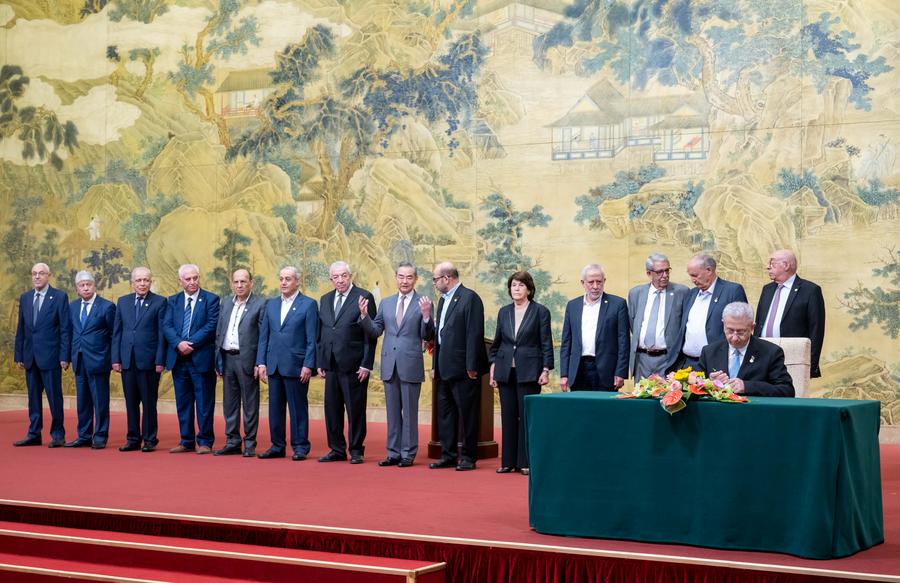
Zhou Yiqi, Associate Fellow, Center for West Asian & African Studies, Shanghai Institutes for International Studies
Oct 18, 2024
China’s efforts to mediate between various Palestinian groups is a first step toward bridging the divide between Palestine and Israel. The U.S. must also take ownership of its responsibility and similarly employ its significant influence over Israel.
Ghulam Ali, Deputy Director, Hong Kong Research Center for Asian Studies
Sep 21, 2024
Saudi Arabia and the UAE are undergoing transformations in which China can play an important role. Premier Li Qiang’s visit reinforced them by focusing on trade, business, investment and diplomacy. This reflects China’s broader policy prioritizing economic cooperation over geopolitical entanglement.

Ghulam Ali, Deputy Director, Hong Kong Research Center for Asian Studies
Aug 16, 2024
The emerging defense pact with the United States, will be a decisive moment for Saudi Arabia and for broader Middle Eastern politics. Until it is ratified, the kingdom will likely strive to maintain defense partnerships with both the U.S. and China.

Wang Zhen, Research Professor, Shanghai Academy of Social Sciences
Aug 08, 2024
Many people in the West tend to view the expansion of China’s influence in the Middle East through the lens of great power rivalry. China rejects this concept, and its diplomatic efforts have helped to prevent the escalation of regional crises.

He Wenping, Senior Research Fellow, Charhar Institute and West Asia and Africa Studies Institute of the China Academy of Social Sciences
Jun 07, 2024
Increasing isolation is making it difficult for the Netanyahu government to secure support from the United States, which faces a dilemma: It can continue to back Israel, or it can distance itself from Netanyahu, either of which could have serious electoral consequences for President Joe Biden.

Wang Zhen, Research Professor, Shanghai Academy of Social Sciences
May 29, 2024
The recent act passed in the U.S. House of Representatives — even if endorsed by the Senate and signed into law by the president — is unlikely to be effective in eliminating antisemitism in the United States. A kind of national reconciliation will be required.

Zhang Tuosheng, Principal Researcher at Grandview Institution, and Academic Committee Member of Center for International Security and Strategy at Tsinghua University
May 22, 2024
Despite their positive aspects, globalization, multi-polarization and technological advancement come with pronounced negatives that pose challenges to the post-Cold War world order. The only way forward is for the West to cooperate with China and engage in active and candid dialogue.

Zhou Yiqi, Associate Fellow, Center for West Asian & African Studies, Shanghai Institutes for International Studies
May 17, 2024
Sustainable peace in the Middle East — in particular between Israel and the Palestinians — will require meaningful change in Palestine’s status: Its sovereignty must be established and recognized. A unified push by China and the United States to that end would be an important guarantor of success.
Wang Zhen, Research Professor, Shanghai Academy of Social Sciences
Apr 30, 2024
The protracted conflict may force the U.S. president to alienate Israel’s Benjamin Netanyahu to the point of jeopardizing the special relationship, thereby causing powerful Jewish voters and lobbies to withdraw their support. Other traditional Democratic constituencies, such as Muslim-Americans, may follow suit.

Jodie Wen, Postdoctoral researcher and assistant fellow, Center for International Security and Strategy at Tsinghua University
Yitong Liu, Master, Committee on International Relations at the University of Chicago
Apr 30, 2024
The youth will be crucial for President Joe Biden’s bid for re-election, as it was in 2020. But Biden’s continued support for Israel is cooling their ardor. To make matters worse, support for Biden among Muslim-Americans — a key voting bloc in some swing states — has taken a nosedive.